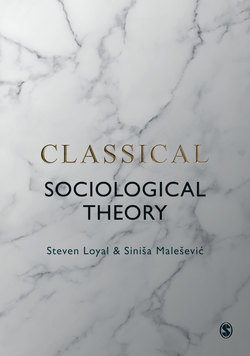Читать книгу Classical Sociological Theory - Sinisa Malesevic - Страница 9
На сайте Литреса книга снята с продажи.
The Layout of Chapters
ОглавлениеThe main aim of this book and its companion volume, Contemporary Sociological Theory, is to provide a critical and contextual introduction to social thought. In this context we analyse contributions of the key thinkers who have shaped and continue to influence sociological theory today. Hence the book contains 12 chapters focusing on the most influential representatives of different approaches within social theory. Some chapters are devoted to exposition of a single theorist, while other chapters analyse the contributions of two or more scholars who tend to be part of the same intellectual tradition. Since each chapter also explores the key contemporary influences of various theoretical perspectives, we briefly present the contributions of many other social thinkers. Thus, this book and its companion volume explore the work of over 100 social thinkers who have made substantial contributions towards advancing sociology as an explanatory and theoretical project. Even though we have attempted to be as comprehensive as possible we could not possibly cover all aspects of social thought and all theorists whose contributions could merit inclusion in this book. The latter remains an open possibility for others to pursue.
This volume explores the work of classical social thinkers starting with the pre-sociological and proto-sociological approaches of Plato, Aristotle, Confucius, Ibn Khaldun, de Tocqueville, Martineau and Hegel. Our aim here was to trace the intellectual sources that have shaped thinking about the social world before and in the immediate aftermath of modernity. The first part concludes with the chapters zooming in on the four key classical theorists who have influenced the formation of sociological thought in the late nineteenth and early twentieth century – Marx, Weber, Durkheim and Simmel. In addition, we also analyse two sociological perspectives that had enormous influence for the birth of sociology as an academic discipline but have largely been ignored by the late twentieth- and early twenty-first-century scholars – the elite theory (Pareto, Mosca and Michels) and the bellicist theory (Hintze, Gumplowicz and Ratzenhofer).2 Although classical theory derives for the most part from Continental Europe, two key North American figures, DuBois and Mead, are also discussed.
Each chapter is intentionally structured in a similar way so that the reader can get the sense of the time, place and key structural influences that have shaped individual theorists. Thus, we explore the biographical and intellectual context of the theorists and then focus on the wider historical, social and political environment in which respective scholars have lived and worked. Each chapter also discusses the central ideas and arguments associated with a specific theoretical approach and then looks at the contemporary relevance and applications of their ideas. The chapters end with the criticisms of each perspective and we also provide lists of references for each theorist.
One of the key ambitions of this book is to contextualise sociological thinking and to do this it is paramount to situate each theoretical contribution within its social, economic, political, historical and biographical context. Since sociology is an intellectual endeavour that is continuously shaped by its own social environment, it is crucial that the knowledge we produce, use and disseminate to others is understood within this wider context in which it is forged. Unlike physics, which perhaps can advance with the use of abstract and de-contextualised knowledge, sociology is a social and historical project that can never be completely removed from the time and place in which it is created.
